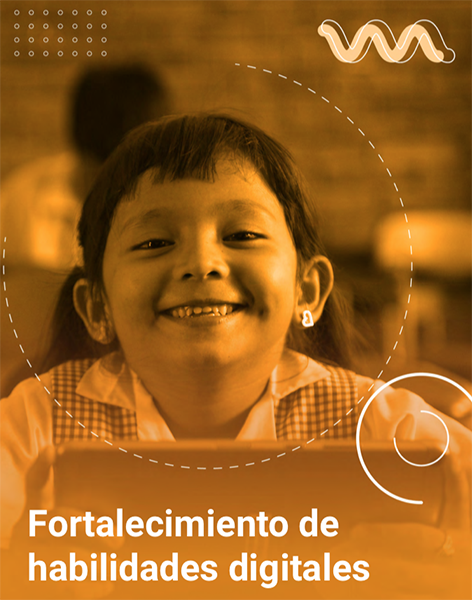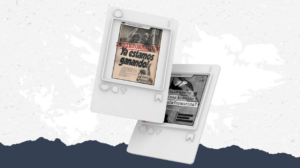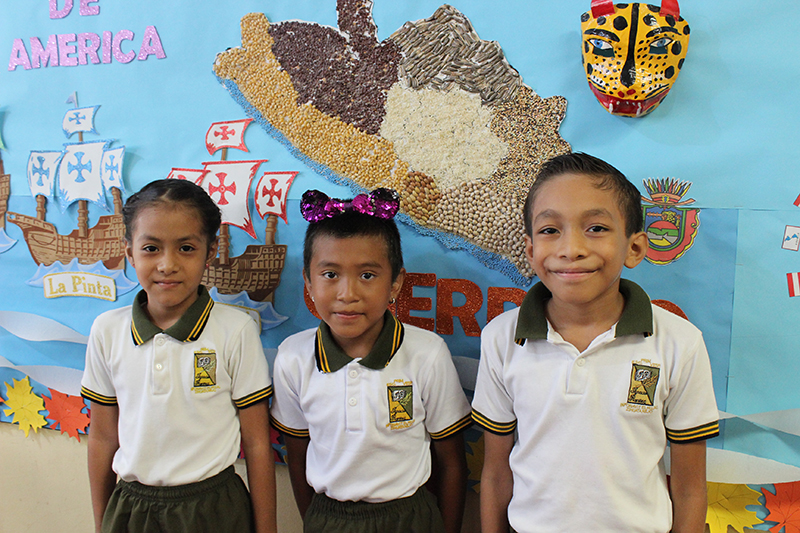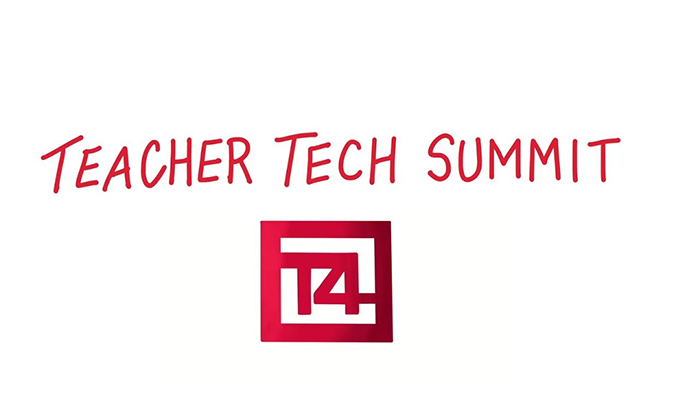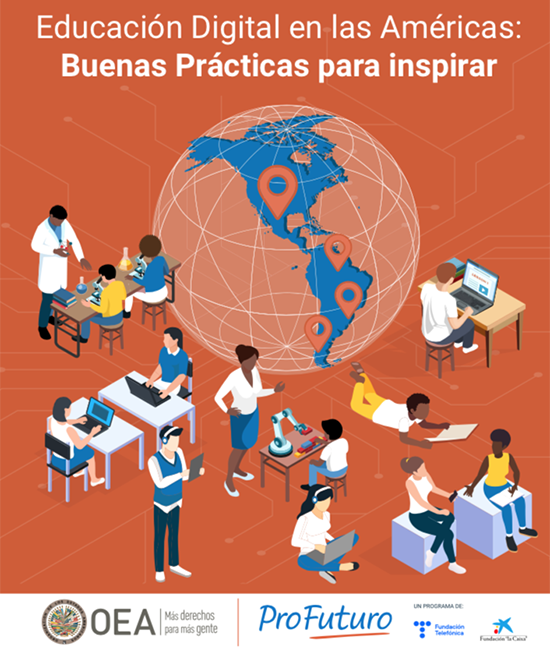Learning to check information
Media and information literacy and the development of critical thinking are basic skills for the 21st century. For this reason, the Argentinean organisation Chequeando develops educational projects to reduce misinformation and improve public debate. To this end, in partnership with secondary school teachers, produce innovative content and resources they experiment with different formats and develop educational research and training activities on a small and large scale.
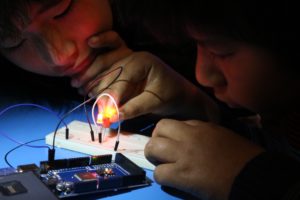
Atalaya Sur: Promoting community Internet connection in vulnerable environments
Atalaya Sur was born in 2014 to guarantee Internet connection in Villa 20 of the City of Buenos Aires. Today, nine years later, they have confirmed that the digital gap closes when the excluded can appropriate the technological culture. For this reason, they organise workshops so that children, young people and their parents can recognise technological languages, appropriate them and become content producers and potential innovators. With Atalaya Sur, students are trained in workshops in art, science and technology and reading, writing and mathematics. In the workshops, students will find a place where they can learn various artistic disciplines through digital appropriation.
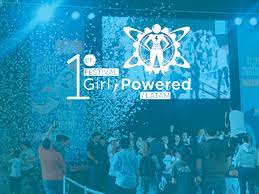
Empowering girls with STEM
Girl Powered is an international movement that shows girls how exciting it is to be involved in Science, Technology, Engineering and Mathematics (STEM) activities to develop skills in designing, building and programming robots, skills that are in high demand in today’s industrial revolution. In this case, this project provides an opportunity for the inclusion of Colombian girls from Antioquia by developing their creative, technological and socio-emotional skills and abilities. Accompanied by their teachers, they receive a complete programme of training, advice and accompaniment to solve a problem in their community, and participate in an international event, the Girl Powered Fest where they demonstrate what they have learned, present and share the culture of their territories and compete among their peers.

Digital “pills” to transform education
Remedios Digitales S.A. is a very special pharmacy. It is located on YouTube and offers digital remedies to improve education. Operated by Proyecto Nuevo Maestro, the “pharmacy” offers a series of dynamic, different and interactive capsules to explain different pedagogical tools, both analogue and digital, useful to improve distance learning environments. The Digital Remedy capsules are organised in two seasons. The first of these is focused on strengthening the use of digital tools in educational spaces. These include tools such as Canva, Classroom, Mind maps, Padlet, Jamboard, Mentimeter, Book creator, Zoom, Kahoot or Duolingo for schools. On the other hand, the capsules of the second season focus on three different categories: social-emotional skills (self-knowledge, self-regulation, growth mindset and self-care), literacy mediation (opening literacy, guided literacy, independent literacy, creative writing and generative word) and learning through play (orientation games, socio-dramatic games, verification games and symbolic games).
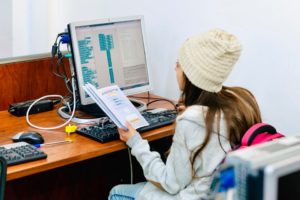
Summer camps to cultivate a love of STEM
The project STEM Camps Ecuador aims to increase the interest and knowledge of children and adolescents in Science, Technology, Engineering and Mathematics. To this end, recreational workshops were implemented for vulnerable children aged 8 to 15. During the camps, participants received training in robotics, programming, energy, internet safety, video games, etc. In addition, they made technical visits to important companies and engineering projects, such as wind power plants, factories and university laboratories, and had the opportunity to interact with science and engineering professionals through a mentoring programme.
O-Lab: inclusive, tailor-made, barrier-free education
In Colombia alone, there are more than 380,000 registered indigenous students, of whom only 29 per cent will complete secondary school and only 5 per cent will go on to higher education. We all deserve access to digital education regardless of the colour of our skin, the language we speak or where we come from, so Fundación El Origen has developed an innovative and easily scalable pedagogical approach and technology to bring digital education to underrepresented communities.
O-Lab is an offline learning application and LMS that works on low-cost devices, with an easy-to-use interface, and is guided by digital tutors who adapt to any language, including indigenous languages and sign language, to ensure that digital education is accessible, personalised, empowering and inclusive for all.
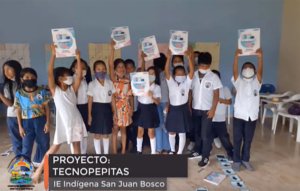
TecnoPepit@s: Building Computational Thinking
This practice presents an introduction to computational thinking, in the framework of the project “Programming for children”, in which children start with disconnected activities, thinking with pencil and paper, the steps of the logical process that will later be used for programming. Once they have done this, the children learn how to programme a microbit. Finally, they apply their knowledge to find a solution to an environmental problem in their environment: that of the endangered charapa turtles. With the help of artificial intelligence and using programmable processors, the students build a simulator with temperature, humidity, lighting and environmental sensors for the incubation of charapa eggs.
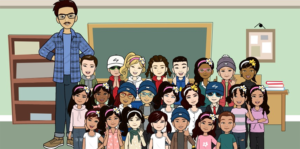
Digital stories to prevent school dropout
In order to strengthen family coexistence, student learning and the socio-emotional and digital skills of the education community during confinement, the Bogotá school Unión Europea developed several projects to increase children’s motivation and desire to study by telling stories through digital comics. Thus, the Math bear, designed to improve mathematics learning, and “Leo the bear”, a video game that brought children closer to their reading and writing classes, were born. In addition, every afternoon, audio stories were narrated, “El cuento del profe Miguel”, to accompany the children and prevent them from disconnecting from their daily school life. In 2021, “el profe Miguel” thought that his students could narrate their pandemic experiences through an astronaut. So that the stories could reach more people, Miguel came up with the idea that they could learn how to use and implement QR codes to read the book. Thus was born the publication “I am a very grounded astronaut”.

Problem-based learning: empathy, Paralympic sports and technology
Problem-based learning is an approach to learning that seeks to get students to arrive at a solution to a problem themselves. In this case, the aim was for students to develop empathic processes that would allow them to reflect on disability, using Paralympic sports and, of course, always using technology. In this way, the students had to develop a device that would enable them to improve the sporting practice of someone with a disability in Paralympic sports. In this video you can find more information about this practice.
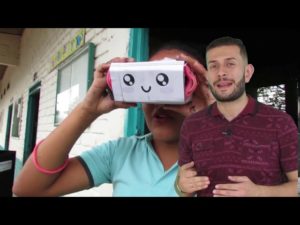
Igniting the flame of your dreams and your life project
Proyectivida is a meaningful experience that blends ICT, STEM methodology and innovation to enable every student to fulfil their life project and dreams, even when the resources to do so are lacking. Thus, using ICT and care for the environment as basic pillars, the students develop various activities related to their life project. For example, they use recyclable materials to make functional technological prototypes associated with their project; they also make virtual reality glasses to watch 3D videos also associated with their dreams and projects; they plant trees that will grow as they and their life project grow, or make animations that serve as a basis for later developing and designing websites… thus, through activities in which they and their dreams are the absolute protagonists, they learn financial education, entrepreneurship, technology, animation and respect for the environment, among many other things.



